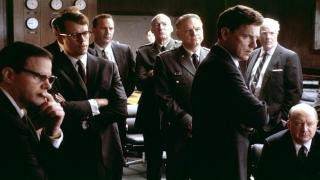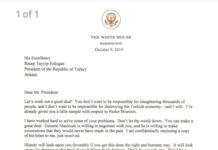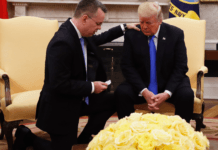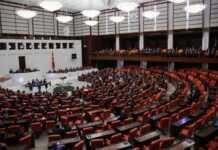
While closely following the Turkish cross-border operation in Syria, I really wonder if these days Tayyip Erdoğan would remember the movie ‘Thirteen Days’ that he had watched long before he became prime minister and president, during the days that he was busy with setting up a new party as a politician banned from politics by the judiciary?
The movie was about the ‘Cuban Missle Crisis’ between the USA and Russia (then named the Soviet Union) which Turkey too was indirectly involved in.
I had watched the film with a journalist couple, and come across Mr. Erdoğan who was just leaving the movie house with a crowd of people around him. We had a very brief talk with him, and learned that he had liked the film very much.
[Columnist Hüseyin Besli, who was to become an AK Party MP for one parliamentary period, and write a biography of Tayyip Erdoğan in the later years, was among the crowd accompanying Erdoğan that day in the movie house. In a piece in the daily Akşam a few days ago, Besli reminded my encounter and my brief talk with Erdoğan that day. He recalls one point in my conversation with Erdoğan wrong: I was hesitant not about Erdoğan’s success but rather about his men around himself with whom he watched the film together that day, and got them elected as MPs or brought to important positions as ministers in his governments in the later years. I may be far from being good in my political anticipations, but not so bad as failing to predict Erdoğan’s success in politics.]
Kennedy prevented an imminent war managing to achieve his goals
The film is about an immensely important crisis that could have led to a war between the two superpowers.
The World War One had broken out 37 days after the assassination of the heir to the Austro-Hungarian Empire. The Cuban crisis lasted 13 days. In that period, the US President John F. Kennedy resisted the top army officers who constantly tried to persuade him to go to war against the Soviet Union as the only viable choice. We learn later that ‘Guns of August’, a book of Barbara W. Tuchman which tells the days leading to the World War One, had a role in that resistance of Kennedy who had read the book a short while ago.
[The scriptwriter of the film made use of the book, ‘The Kennedy Tapes: Inside the White House During the Cuban Crisis’ written by Ernest May and Philip Zelikow, and based on some documents that were newly declassified around the time of the shooting of the movie (2000). The words of the historical figures acted out by the actors in the movie were real talks obtained through the decipherment of the tapes.]
In October in 1962, U-2 spy planes of the USA confirm through photographs that the Soviet Union is busy with deployment of mid-range nuclear missiles in sites in Cuba. The USA feel uneasy about the existence of the missiles in the island across Miami, and consider this a serious threat to its security -so serious that the Russian initiative is seen as casus belli. Kennedy aims to resolve the crisis without a war despite the pressure of the high-command of the US military to go into war against the Soviets. “Well, let us blockade the island at least” say the soldiers. Kennedy, who thinks the Russians may use such a step as casus belli, resorts to a different sanction: According to this plan, the American navy would stop all ships sailing towards Cuba, and would only allow those ships carrying no arms or military equipment. Quarantine, rather than blocade…
Moscow protests the American measure, but Soviet ships obey the sanction and turn back.
The film depicts everything happened in the White House Situation Room during the 13-day crisis day to day.
This is how the crisis is eventually resolved: The Soviets indirectly inform the US administration through a journalist that they are ready to consider removing the missiles from Cuba if the USA promise that they would never attempt to invade Cuba. The White House reaches the conclusion that the Russian message comes directly from Khrushchev himself. The Russians also demand removal of the American ballistic Jupiter missiles in Turkey, and the White House concludes that this second demand is that of the Russian general staff. The Americans decide to accept the former demand while rejecting the latter. Kennedy sends his brother, Robert, whom appointed as Secretary of Justice, to Dobrynin, the Soviet ambassador to the US in Washington, to convey the American message.
The movie that I briefly summarized above may in fact seen as a service of Hollywood to those who are eager to learn more about how international disagreements may be resolved. The crisis in the Cuban missile case is overcome by announcement Khrushchev made about removal of the missiles from Cuba.
A serious crisis that could have led to dire consequences for the whole world as the two opposing super-powers both had nuclear missiles is thus overcome.
I guess you understand why I have recalled this film and the crisis between the USA and the Soviets in 1962 today.
Because I encountered President Tayyip Erdoğan in the same movie house on the same day, I know he watched this film, too. “I was quite impressed” he had told us when commenting on the film.
During the Cuban missile crisis, three countries were often referred to: the USA, Russia (the Soviet Union), and Turkey. We are witnessing an international crisis nowadays, and these three countries are often named again. This time, however, the crisis has already reached the state of war.
Perhaps there will be books in the future telling the chain of developments before and after the Turkish cross-border operation in Syria based on facts -who knows, we may see a movie, too, based on what we’re experiencing in recent weeks.
I’m not sure about what potential success such film may have, but I guess that such a book would stand a great chance of success.
[The reason why I am rather hesitant about the potential success of such a film is that ‘Thirteen Days’ did not do well at the box office and caused financial damage on its producers despite quite positive criticisms it received from film critics.]
ΩΩΩΩ
[Translated by Bernar Kutluğ from the the article appeared in this site’s Turkish section on October 16, 2019]










